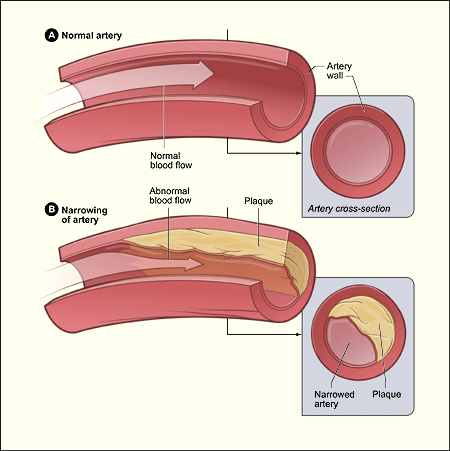Heart
What Is Atherosclerosis?
Atherosclerosis (ath-er-o-skler-O-sis) is a disease in which plaque (plak) builds up on the insides of your arteries. Arteries are blood vessels that carry oxygen-rich blood to your heart and other parts of your body.
Plaque is made up of fat, cholesterol, calcium, and other substances found in the blood. Over time, plaque hardens and narrows your arteries. The flow of oxygen-rich blood to your organs and other parts of your body is reduced. This can lead to serious problems, including heart attack, stroke, or even death.
Atherosclerosis
Illustration showing a normal artery with normal blood flow and an artery containing plaque buildup.
Figure A shows a normal artery with normal blood flow. Figure B shows an artery with plaque buildup.
Overview
Atherosclerosis can affect any artery in the body, including arteries in the heart, brain, arms, legs, and pelvis. As a result, different diseases may develop based on which arteries are affected.
* Coronary artery disease (CAD). This is when plaque builds up in the coronary arteries. These arteries supply oxygen-rich blood to your heart. When blood flow to your heart is reduced or blocked, it can lead to chest pain and heart attack. CAD also is called heart disease, and it's the leading cause of death in the United States.
* Carotid (ka-ROT-id) artery disease. This happens when plaque builds up in the carotid arteries. These arteries supply oxygen-rich blood to your brain. When blood flow to your brain is reduced or blocked, it can lead to stroke.
* Peripheral arterial disease (PAD). This occurs when plaque builds up in the major arteries that supply oxygen-rich blood to the legs, arms, and pelvis. When blood flow to these parts of your body is reduced or blocked, it can lead to numbness, pain, and sometimes dangerous infections.
Some people with atherosclerosis have no signs or symptoms. They may not be diagnosed until after a heart attack or stroke.
The main treatment for atherosclerosis is lifestyle changes. You also may need medicines and medical procedures. These, along with ongoing medical care, can help you live a healthier life.
The cause of atherosclerosis isn’t known. However, certain conditions may raise your chances of developing it. These conditions are known as risk factors. You can control some risk factors, such as lack of physical activity, smoking, and unhealthy eating. Others you can’t control, such as age and family history of heart disease.
Outlook
Better treatments have reduced the number of deaths from atherosclerosis-related diseases. These treatments also have improved the quality of life for people with these diseases. Still, the number of people diagnosed with atherosclerosis remains high.
You may be able to prevent or delay atherosclerosis and the diseases it can cause, mainly by maintaining a healthy lifestyle. This, along with ongoing medical care, can help you avoid the problems of atherosclerosis and live a long, healthy life.
|